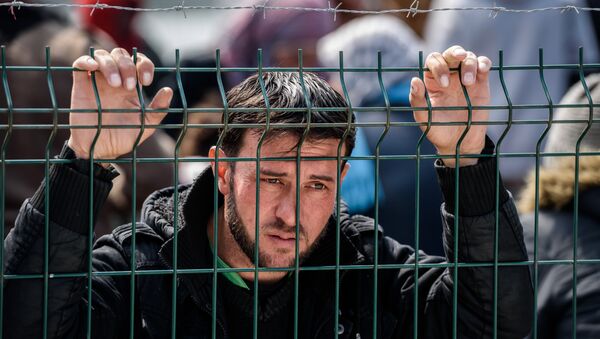The UNHCR announced it was withdrawing support for the EU-Turkey deal after it said the 'hotspots' in which migrants are being processed in Greece are effective prisons. The EU announced on March 18 that it had reached agreement with the government in Ankara for "irregular migrants" — those who did not meet asylum criteria — arriving in Greece would be returned to Turkey and swapped on a one-for-one basis with Syrian refugees who would be admitted into EU member states.
UNHCR not a party to EU-Turkey deal, nor will we be involved in returns or detention. pic.twitter.com/uTWOzbWP0D
— UNHCRNews (@RefugeesMedia) March 22, 2016
The one-for-one swap system was brought in on March 20, with all new arrivals coming under the terms of that deal. However, those who arrived before that date are being held in the hotspots, which the UNHCR says amounts to "mandatory detention."
"Under the new provisions, these sites have now become detention facilities. Accordingly, and in line with our policy on opposing mandatory detention, we have suspended some of our activities at all closed centers on the islands. This includes provision of transport to and from these sites," UNHCR spokesperson Melissa Fleming told reporters.
'Extremely Difficult'
Médecins Sans Frontières (MSF) said Thursday it had "decided to suspend its activities linked to the Moria 'hotspot' on Lesbos without further notice. The decision comes following the EU Turkey deal which will lead to the forced return of migrants and asylum seekers from the Greek island.
"Continuing would make us complicit in a system we consider both unfair and inhumane.” @MSF leaving Moria #Greece https://t.co/usFGw9K9Fu
— MSF International (@MSF) March 22, 2016
"We took the extremely difficult decision to end our activities in Moria because continuing to work inside would make us complicit in a system we consider to be both unfair and inhumane."
"We will not allow our assistance to be instrumentalized for a mass expulsion operation and we refuse to be part of a system that has no regard for the humanitarian or protection needs of asylum seekers and migrants," said Marie Elisabeth Ingres, MSF Head of Mission in Greece.
"Asylum applications, interviews, and assessments could take weeks, or even months, and the result is that asylum-seekers are, and will, be placed in unlawful detention, contrary to International and European Human Rights Law," said Kirsty McNeill, Director of Policy, Advocacy and Campaigns for Save the Children.
Police-Run Detention Facility
The Norwegian Refugee Council (NRC) said it had decided to suspend a number of activities at the refugee and asylum seeker so-called 'hotspot' facility, Vial, on the island of Chios.
"We cannot work independently and safely in a police-run detention facility. Now that it is a detention center we no longer have adequate access to provide assistance to vulnerable refugees," said Alain Homsy, Head of NRC operations in Greece.
European values and #refugees’ rights are threatened by European leaders who seem to have forgotten their own history. #EUTurkeyDeal
— NRC (@NRC_Norway) March 18, 2016
Thousands of asylum seekers and migrants at the Athens port of Piraeus face appalling conditions as the crisis for people trapped in Greece due to border closures intensifies, Human Rights Watch said today. The lack of government involvement, poor organization, and scarce resources, as well as lack of information, anxiety, and fear about the new European Union-Turkey deal, are contributing to insecurity and suffering.
Eva Cossé, Greece specialist at Human Rights Watch said:
"Pregnant women, people with disabilities, and young children in particular are stuck in limbo without dignity or hope. The suffering in Piraeus is a direct consequence of Europe's failure to respond in a legal and compassionate way to the crisis on its shores."
According to @amnesty #Turkey has already deported 30 #Afghans back to #Afghanistan without granting them access to an asylum procedure.
— AnnaPantelia (@Anna_Pantelia) March 24, 2016
On Monday evening the International Rescue Committee informed the Greek coastguard that we would not transport refugees to the closed facility at Moria.
"We cannot knowingly participate in the transportation of some of the world's most vulnerable to a place where their freedom of movement is in question," it said.


